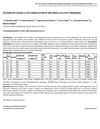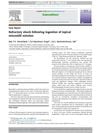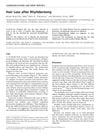
Hair loss can happen after severe H1N1 flu but usually grows back in 4 months.
 5 citations,
March 2016 in “Medical journal, Armed Forces India”
5 citations,
March 2016 in “Medical journal, Armed Forces India” A man experienced life-threatening shock after swallowing hair growth solution.
 4 citations,
October 2020 in “Research Square (Research Square)”
4 citations,
October 2020 in “Research Square (Research Square)” Hydroxychloroquine, nitazoxanide, and ivermectin were similarly effective in treating early COVID-19.
 6 citations,
June 2004 in “Dermatologic Surgery”
6 citations,
June 2004 in “Dermatologic Surgery” A woman had temporary hair loss after a facelift, which improved on its own within a year.
 115 citations,
June 2004 in “Pediatrics”
115 citations,
June 2004 in “Pediatrics” Children, especially teenagers, can get severe SARS-CoV infection with symptoms similar to adults, but they typically recover well with supportive care.
 7 citations,
January 2021 in “The journal of gene medicine”
7 citations,
January 2021 in “The journal of gene medicine” Certain genetic differences may affect how likely someone is to get COVID-19 and how severe it might be.
 49 citations,
May 2020 in “Frontiers in Public Health”
49 citations,
May 2020 in “Frontiers in Public Health” Insulin resistance linked to obesity may increase COVID-19 severity.
 34 citations,
September 2020 in “BMC Endocrine Disorders”
34 citations,
September 2020 in “BMC Endocrine Disorders” Existing drug dexamethasone may lower death risk in severe COVID-19 cases; more research needed for other drugs.
 32 citations,
July 2021 in “Journal of The American Academy of Dermatology”
32 citations,
July 2021 in “Journal of The American Academy of Dermatology” Hair loss from COVID-19 usually starts around 45 days after infection and lasts about 47.5 days.
 8 citations,
August 2009 in “Pediatric transplantation”
8 citations,
August 2009 in “Pediatric transplantation” A five-month-old boy with Omenn syndrome successfully recovered after a stem cell transplant with reduced intensity conditioning.

Ingesting minoxidil can cause serious heart problems and requires urgent medical treatment.
 42 citations,
November 2004 in “Paediatric Respiratory Reviews”
42 citations,
November 2004 in “Paediatric Respiratory Reviews” Children generally have milder SARS symptoms than adults, with good outcomes and no deaths reported, but long-term effects are unclear.
 737 citations,
August 2020 in “Journal of Infection”
737 citations,
August 2020 in “Journal of Infection” Many COVID-19 survivors experience long-term symptoms but still report satisfactory quality of life and return to work.
 273 citations,
May 2017 in “The Lancet”
273 citations,
May 2017 in “The Lancet” Some drugs can cause rare but potentially deadly skin reactions, and early treatment and avoiding the drug again are key.
 248 citations,
November 2011 in “The EMBO Journal”
248 citations,
November 2011 in “The EMBO Journal” Wnt1/βcatenin signaling is crucial for heart repair after injury.
 185 citations,
August 2020 in “Mayo Clinic Proceedings”
185 citations,
August 2020 in “Mayo Clinic Proceedings” Men are more likely to have severe COVID-19 cases and fatalities than women due to factors like lifestyle, aging, and biological differences.
 125 citations,
August 2020 in “Frontiers in Immunology”
125 citations,
August 2020 in “Frontiers in Immunology” Men generally have more severe COVID-19 cases and higher death rates than women due to biological differences.
 121 citations,
November 2020 in “Endocrine”
121 citations,
November 2020 in “Endocrine” Male hormones like testosterone may make COVID-19 worse, and testing for sensitivity to these hormones could help predict how severe a patient's symptoms might be. Treatments that reduce these hormones are being explored.
 113 citations,
July 2020 in “Communications biology”
113 citations,
July 2020 in “Communications biology” Men, especially older ones with health issues like prostate cancer, may have worse COVID-19 outcomes and could benefit from therapies targeting male hormones.
 88 citations,
October 2020 in “Open Forum Infectious Diseases”
88 citations,
October 2020 in “Open Forum Infectious Diseases” Some people who recover from COVID-19 continue to have symptoms like fatigue and cough for over 120 days, and some experience hair loss about 59 days after getting sick.
 84 citations,
March 2010 in “Infectious Disease Clinics of North America”
84 citations,
March 2010 in “Infectious Disease Clinics of North America” The document concludes that rapid identification, isolation, and strict infection control are crucial to manage SARS outbreaks.
 68 citations,
May 2021 in “Endocrine”
68 citations,
May 2021 in “Endocrine” People with diabetes or obesity should manage their conditions carefully as they have a higher risk of severe COVID-19.
 65 citations,
September 2010 in “Journal of the Neurological Sciences”
65 citations,
September 2010 in “Journal of the Neurological Sciences” Kennedy's disease leads to muscle weakness and sensory issues, has no cure but manageable symptoms, and future treatments look promising.
 63 citations,
March 2000 in “Annals of clinical psychiatry”
63 citations,
March 2000 in “Annals of clinical psychiatry” Some psychiatric medications can cause hair loss, but it usually grows back after adjusting the medication.
 58 citations,
December 2020 in “Mayo Clinic Proceedings”
58 citations,
December 2020 in “Mayo Clinic Proceedings” The conclusion is that individual differences in COVID-19 severity are influenced by factors like age, sex, race, and genetics, which are important for personalized medicine.
 56 citations,
April 2015 in “American journal of medical genetics. Part A”
56 citations,
April 2015 in “American journal of medical genetics. Part A” Patients with Bohring-Opitz syndrome and ASXL1 mutations need regular kidney ultrasounds to check for tumors.
 48 citations,
November 1992 in “International Journal of Dermatology”
48 citations,
November 1992 in “International Journal of Dermatology” Toxic epidermal necrolysis is a severe skin reaction often linked to drugs, requiring careful medication use and supportive care.
 42 citations,
April 2021 in “Journal of clinical pharmacology”
42 citations,
April 2021 in “Journal of clinical pharmacology” Baricitinib helps treat several diseases, including COVID-19, but has side effects and needs careful monitoring.
 37 citations,
March 1990 in “The Journal of Pediatrics”
37 citations,
March 1990 in “The Journal of Pediatrics” Toxic shock syndrome is caused by a complex interaction of bacterial toxins and the immune system, and understanding this can help improve diagnosis and treatment.
 31 citations,
August 2020 in “EClinicalMedicine”
31 citations,
August 2020 in “EClinicalMedicine” Male cancer patients have a higher risk of severe illness and death from COVID-19 than female patients.






























